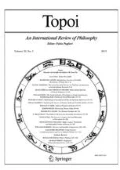Abstract
Although Abelard arrived at a view ofens nearer to Aristotle's than his sources would suggest, unlike thirteenth-century thinkers he did not work out a view of transcendentals in terms ofens, its attributes and their convertibility. He did, however, regard unity (though not goodness or truth) as an attribute of every thing. At first, Abelard suggested that unity, being inseparable, could not be an accident according to Porphyry's definition (‘that which can come and leave a subject without the subject being corrupted’): either it is some type of form not classified by Porphyry, or not a form at all. In his later logical work, Abelard argued differently. Unity, he said, is an accidental form, but Porphyry's definition of an accident must be understood ‘negatively’, not as asserting something about what could happen in reality (since the form of unity could never leave its subject) but rather something about an absence of connection: were it,per impossible, to occur, the loss by a subject of its form of unity would not lead to the loss of its specific or generic status.
Similar content being viewed by others
Author information
Authors and Affiliations
Rights and permissions
About this article
Cite this article
Marenbon, J. Abelard,ens and unity. Topoi 11, 149–158 (1992). https://doi.org/10.1007/BF00774420
Issue Date:
DOI: https://doi.org/10.1007/BF00774420



